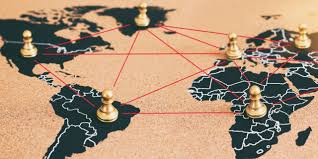by Nat Winn
There are a number of scholars and activists coming at things from varying perspectives that posit that capitalism is either at an end stage or has already turned into something else. Yanis Varoufakis argues that human society has transitioned into a new system called Techno-feudalism. Jodi Dean says we are living in neo-feudalism. A number of world systems theorists claim that capitalism is currently in terminal decline.
This is not the first time that very smart people have predicted or claimed the death of capitalism. In the 30s there was general crisis theory, for instance, and the idea that after fascism, then socialism. Capitalism though, has always seemed adaptable to change and if it wasn’t handily defeated it would mutate into new versions of itself, from Keynesian to fascism to Neo-liberalism and so on. Somehow though, many today are sensing that something is different.
The world has been saturated with capitalist social relations and the space for expansion and growth in a finite world is running out. Changing climate due to so many forms of pollution and environmental degradation threaten ecosystems and human civilization itself. And there is the always lingering threat of nuclear annihilation. In any event, systems run up against their limits and it is wrong headed to think even that capitalism will just keep on keeping on.
While it is certainly possible that the United States dominated neo-liberal order can be replaced by some new imperial hegemon, it is also possible that technology and human social relations are morphing into something entirely new, a next system.
Historically Marxists have thought that capitalism would be replaced by socialism and that we would then transition into a classless communist society, but it turned out that the road to a more egalitarian future was much more tortuous.
Still, while history did not play out exactly in the ways that Marx and his followers had predicted, his dictum that people change the world but not in any way they so choose and are bound by historical conditions, is still a valuable insight. If capitalism is dying, then there is a struggle over what will come next. The world can go in a more tyrannical direction and continue to be marked by class division and inequality, or it can go in a more egalitarian direction more amenable to peace and security among peoples.
So where does China, BRICS, and the resistance come in?
There are currently many analyses of China, just by those who fall on the side of wanting an egalitarian future.
China is socialist. China is capitalist. China is a sovereign national project and anti-imperialist counterweight to U.S. hegemony. China is an emerging imperialist rival to the U.S./NATO bloc. Some argue that China is in a state of becoming and that it can go in many different directions.
Of course, all these things cannot be true. How do we develop our own analysis that guides practice in struggling to build a liberating planet?
Some of these questions revolve around older Marxist debates around class struggle and the state. Can classes contend over the state for power and influence as the Frankfurt school once argued or is the state an instrument of class dictatorship that reflects the broader social relations in society as a whole? Can a world system or social system change qualitatively, or can a constellation of oppressed social forces take power from another oppressive constellation of social forces without massive upheaval, without revolution?
What does history tell us? What does what’s happening in the world right now indicate? I suspect the answers to some questions might give us a clue, though a deeper dive into the actual societies in question (China, the BRICS more generally, the resistance to genocidal Israel) will be necessary. For instance, how do we understand the various states in question, in relation to the people who live and are ruled by those states? And then looking outward again, what are the forces and threats to these social forces (countries, blocs, alliances) that bind them together, even when it may seem that internally their collective interests don’t ultimately coincide? What does this mean for how those who want to struggle for an egalitarian world develop their own coherent strategies to traverse the diverse forces at play, develop strategic alliances, and maintain some degree of independent movement?
Hopefully laying out the questions this way, will help sharpen up how we develop answers.
To be continued.

